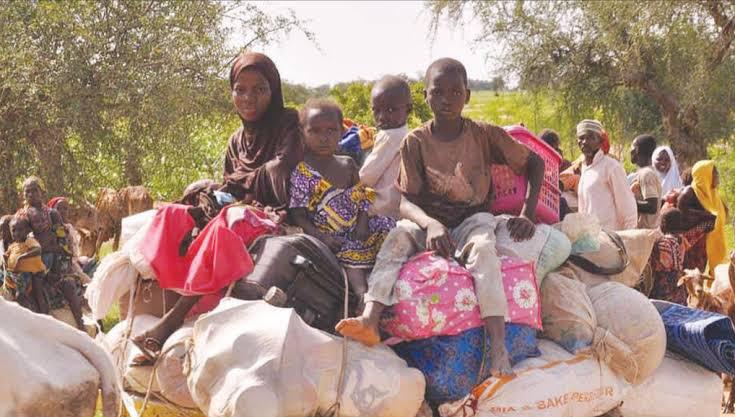
A sub-region well known for its poverty headcount, northwestern Nigeria has become a home to thousands and different terrorists who continue to challenge the security apparatus deployed by the government to resist them.
The sub-region is troubled and has been stained with blood as banditry, cattle rustling, kidnapping for ransom, pillage, and other forms of criminality by different terror gangs intensify in 2020.
Criminal activities continue to occur almost on a daily and include overnight attacks especially in Katsina, Zamfara, Kaduna and Sokoto states.
There is no accurate number of people killed so far due to the escalating insecurity but different reports estimated that no less than 8,000 persons have lost their lives to the carnage since 2011, predominantly in Zamfara State.
But the year 2020 has seen a countless number of residents massacred, women raped, communities destroyed, farm produce burnt to ashes, farmers killed and thousands displaced to nearby communities and the neighbouring Niger Republic.
The crisis, according to the HumAngle investigation, has forced over 70,000 community dwellers in those states to flee, crossing the border into Niger Republic to seek refuge.
Some parts of Kano have also recorded cases of kidnappings especially in communities neighbouring the Falgore forest in the Doguwa Local Government Area.
The banditry in the sub-region has become a sophisticated enterprise challenging the capacity and the authority of the states.
Reports have shown that terrorists referred to as bandits by the locals have gained more ground in Katsina and Zamfara states, where they network and exert forces on the remote villages.
According to Bello Matawalle, Governor of Zamfara State, the so-called bandits converge in the state and travel to different parts of the northwest to carry out attacks.
“Bandits from these centres, they will go to other states far away and operate, only to come back again,” the governor said.
Matawalle reiterated his comment, “because all the bandits and their leaders are in the state.”
Jihadists Infiltration
But as these northwest states are grappling with incessant attacks by these bandits, jihadists are steadily stepping up their presence in the sub-region, taking advantage in the surge of criminality and security loopholes.
In what analysts described as a bewildering expansionist agenda, Jama’atu Ahlussunnah Lidda’awati Wal Jihad (JAS), otherwise known as Boko Haram, continues gaining weight and sealing allegiances in the region.
An investigation by HumAngle has revealed that, as of July 2020, the JAS faction of Boko Haram had over 400 active fighters in the northwest.
This figure, according to the report, does not include those of Ansaru and ISWAP who are already established in the sub-region and ready to wage a monstrous war on citizens at any time.
International Crisis Group (ICG) warned that jihadists are gaining sway and could become a land bridge across terrorists in the Sahel.
“As security has deteriorated, the region has steadily come under the renewed influence of jihadist groups, which have also stepped up attacks on security forces,” the Group said.
“The spike in jihadist activity in the northwest has raised fears that the region could soon become a land bridge connecting Islamic insurgencies in the central Sahel with the decade-old insurgency in the Lake Chad region of northeastern Nigeria.”
Southern Kaduna
The worrying reports of killings and abductions in Southern Kaduna are of critical security concerns.
Several communities in Birnin Gwari Local Government Area of Kaduna State were ravaged by the seemingly never-ending violence in the southern part of the state.
Hundreds of people were killed and many others displaced as communities burnt to ashes in as many violent crises that have happened in the area.
According to a report by the Amnesty International, armed men killed at least 366 people in multiple attacks between January and July 2020.
“Violence has been on and off in southern Kaduna since the aftermath of 2011 elections and authorities have failed to end the violence or bring the perpetrators to justice,’’ the Amnesty report observed.
The security vacuum in Southern Kaduna has created a safe haven for kidnappers along Abuja-Kaduna highway which has become a centre of kidnappings.
With its thick rows of neem and baobab trees, the less than 200km road has provided an excellent cover for the armed gangs hiding in wait.
Drivers say that the criminals now operate anytime through collaborators, who disguise as commercial bus drivers.
“Such drivers don’t pick passengers from the garage, but along the road, and once they get to the outskirts, they will pretend that the vehicle has developed a problem.
“After a while, the kidnappers will emerge from the bush and take the passengers to an unknown destination,” they said.
The notorious kidnappers blocked the highway four times on November 14, 2020, and abducted many commuters, including nine students of Ahmadu Bello University (ABU) Zaria.
The terrorists are currently moving to some remote communities in Kano, especially in Bebeji Local Government Area.
Support Our Journalism
There are millions of ordinary people affected by conflict in Africa whose stories are missing in the mainstream media. HumAngle is determined to tell those challenging and under-reported stories, hoping that the people impacted by these conflicts will find the safety and security they deserve.
To ensure that we continue to provide public service coverage, we have a small favour to ask you. We want you to be part of our journalistic endeavour by contributing a token to us.
Your donation will further promote a robust, free, and independent media.
Donate HereStay Closer To The Stories That Matter




